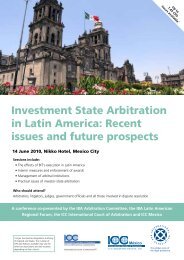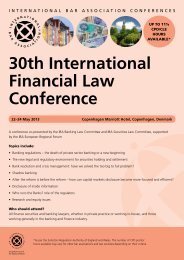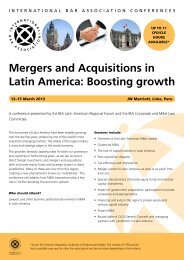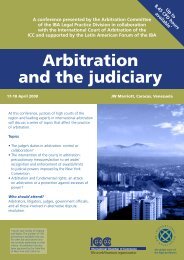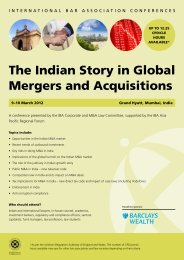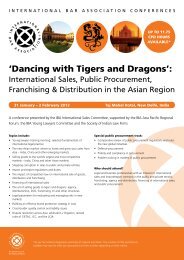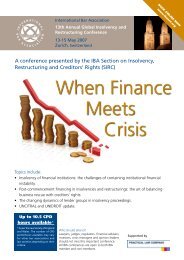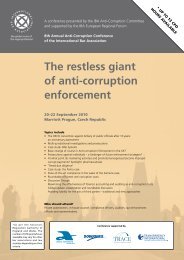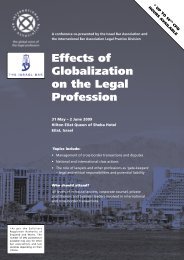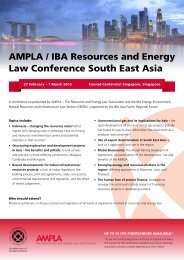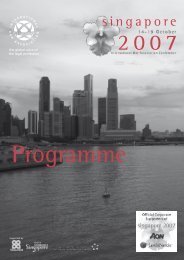Final Programme - International Bar Association
Final Programme - International Bar Association
Final Programme - International Bar Association
Create successful ePaper yourself
Turn your PDF publications into a flip-book with our unique Google optimized e-Paper software.
Working sessions – Thursday<br />
114<br />
Wednesday 1730 – 1830<br />
Open committee business meeting<br />
Presented by the <strong>International</strong> Sales Committee.<br />
An open committee meeting of the <strong>International</strong> Sales Committee<br />
will be held to discuss matters of interest and future activities.<br />
Thursday 0730 – 0930<br />
LIFFEY MEETING ROOM 3, LEVEL 1<br />
BIC open forum and open policy committee<br />
breakfast meeting<br />
Presented by the <strong>Bar</strong> Issues Commission.<br />
All bar association representatives are invited to join this meeting for<br />
information on the future plans, projects and conference sessions<br />
organised by the <strong>Bar</strong> Issues Commission (BIC). There will be a report<br />
from the BIC Policy Committee and business items in the Council<br />
Agenda will also be discussed.<br />
Thursday 0800 – 0930<br />
MARQuEE, CCD<br />
Open committee business meeting and<br />
breakfast<br />
Presented by the Academic and Professional Development Committee.<br />
An open meeting of the Academic and Professional Development<br />
Committee will be held to discuss matters of interest and future<br />
activities.<br />
Thursday 0830 – 1230<br />
Law firm visits<br />
Presented by the Law Firm Management Committee.<br />
FOYER, LEVEL 5<br />
Session Co-Chairs<br />
Charles Coward Uría Menéndez, <strong>Bar</strong>celona, Spain; Vice-Chair<br />
Europe, Law Firm Management Committee<br />
Herman J Knott Luther, Cologne, Germany; Secretary, Law Firm<br />
Management Committee<br />
Chris Van Olmen Van Olmen Wynant, Brussels, Belgium; Senior<br />
Vice-Chair, Employment and Industrial Relations Law Committee<br />
Officers of the Law Firm Management Committee will lead a group<br />
of IBA delegates to visit several Dublin law firms for briefings on<br />
strategy, practice management, organisational issues, marketing<br />
and office systems.<br />
Places will be strictly limited and allocated on a ‘first come, first<br />
served’ basis at the conference. To register your attendance, please<br />
visit the IBA speakers’ desk at the conference.<br />
The coach will depart from the CCD at 0830.<br />
Speakers<br />
Myra Garrett William Fry, Dublin, Ireland<br />
Philip Lee Philip Lee Solicitors, Dublin, Ireland<br />
Julian Yarr A&L Goodbody, Dublin, Ireland<br />
Thursday 0930 – 1100<br />
Tax reps, warranties and indemnities: effects<br />
and related disputes<br />
Presented by the Taxes Committee.<br />
Session Co-Chairs<br />
Andrew Loan Macfarlanes, London, England<br />
Paul Sleurink De Brauw Blackstone Westbroek, Amsterdam, the<br />
Netherlands<br />
Tax reps and warranties raise important issues for the transactional<br />
tax lawyer. This panel will not review the standard reps and<br />
warranties included in share or asset purchase agreements, but will<br />
take the topic one step further by discussing the practical impact<br />
of the tax provisions on transaction accounting issues in general<br />
and ‘locked box’ transactions in particular. Moreover, the panel will<br />
address the treatment of ‘earn-outs’, the practicalities of disputes and<br />
litigation arising from tax reps and warranties, and whether damages<br />
can always be structured as an adjustment of the purchase price.<br />
Speakers<br />
Kevin Colan Osler Hoskin & Harcourt, New York, USA<br />
Torsten Engers Flick Gocke Schaumburg, Frankfurt am Main,<br />
Germany<br />
Paul Fahy A&L Goodbody, Dublin, Ireland<br />
Oleh Marchenko Ulysses, Kiev, Ukraine<br />
Peter Ni Zhong Lun Law Firm, Shanghai, China<br />
John Peterson Minter Ellison, Auckland, New Zealand<br />
Coffee and tea breaks will be held between 1100 – 1130 and<br />
1600 – 1630. To accommodate the flow of delegates through the<br />
Conference Centre please note the closest coffee/tea station to<br />
this session is outside Conference Rooms 1-5, Level 1.<br />
Thursday 0930 – 1230<br />
CONFERENCE ROOM 3, LEVEL 1<br />
Class actions or mass actions – the experience<br />
of litigators and financial institutions<br />
Joint session with the Banking Law Committee and the Litigation<br />
Committee.<br />
Session Co-Chairs<br />
Angelo Anglani NCTM StudioLegale Associato, Rome, Italy;<br />
Corporate Council Forum Liaison Officer, Litigation Committee<br />
Russell DaSilva Hogan Lovells US, New York, USA; Chair, Financial<br />
and Banking Law Conferences Subcommittee<br />
The global financial crisis resulted in thousands of legal actions<br />
brought by investors vis-à-vis banks and other financial institutions.<br />
The common situation in which the investors found themselves (they<br />
had lost their investment and/or felt misled and misinformed) led<br />
them to identify common grounds of action and conceive either class<br />
actions or mass actions to claim damages for the loss suffered. The<br />
defendants often found themselves exposed to liabilities they had<br />
never considered before.<br />
In the first part of the session, the panellists will describe the strategy<br />
choices of claimants’ and defendants’ counsels, and the positions of<br />
the involved financial institutions. The second part of the session will<br />
compare the ways in which different jurisdictions have approached<br />
the challenges that resulted from the avalanche of financial crisis<br />
litigation. This comparative overview will allow the participants to<br />
evaluate the efficiency of the various procedural systems and to draw<br />
conclusions on the lessons to be learned by financial institutions and<br />
litigators. It remains open what, among the classical class actions, the<br />
various European models of mass actions and traditional individual<br />
litigation systems, produce the better results.



